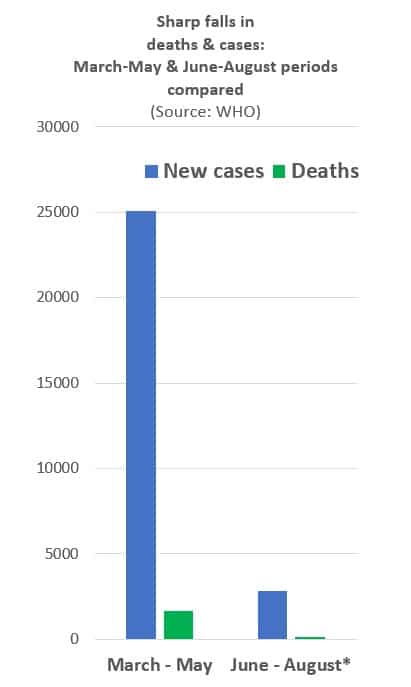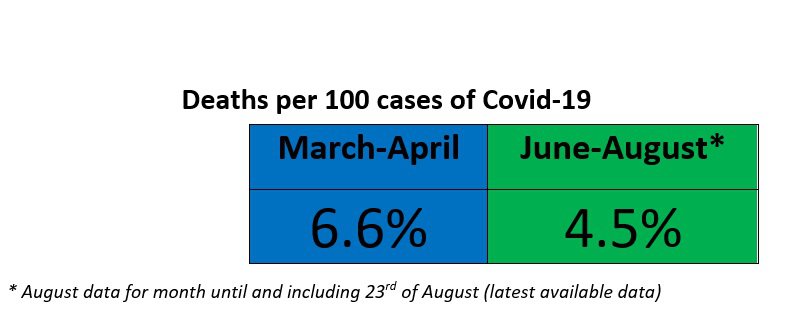Marc Coleman, founder of Octavian Public Affairs, discusses the need for institutions to reflect a representative mixture of the population in terms of experience and exposure to the implications of the crisis.

The dramatic extent of decline in cases and deaths between the two periods is illustrated by the fact that the chart needs to be elongated for the full length of this page to make the figures for deaths in the June – August period perceptible: From 1,650 deaths recorded in the three month period to the 1st June, 127 deaths were recorded between 1st June and 23rd August. The rate of deaths per 100 cases has also fallen, from an average of 6.6 per cent during the March-May period to 4.5 per cent since 1st June.
The lockdown is likely to have done all it can. From this sledgehammer solution, attention needs now to shift to more forensic, targeted instruments. To that end, the NPEHT may need to diversity its membership.

Dodged or lodged?
Whether this week’s bullet has been dodged, or whether it has lodged in the body politic, only time will tell.
Much time may not be needed: Whereas July’s stimulus package had recourse to unlimited borrowing – as the CEO of the NTMA warned over the summer – October’s budget may come up against more hard hearded realities and hard choices will need to be made, choices that any perception of elitism or disconnect of those most affected by Covid-19 will make difficult if not impossible to implement. The lesson of Golfgate is that policy makers must not only be diverse but also connected with economic reality.
This is as much good management as it is good politics. The need for diversity in business is understood by those in the private sector. But as well as as gender diversity and ensuring an obvious mix of functional expertise (finance, HR, logistics and marketing) management theorists like Meredith Belbin have also pointed to the need – particularly in project management teams – to ensure a mix of personalities and backgrounds. The need for technical expertise is a given in any project management team. But also needed are interlocutors – those who can understand and relay the concerns of outside stakeholders. In addition change managers are needed as are problem solvers and innovators.
And particularly in a Covid-19 recession context, there is a need for policy making bodies and institutions to reflect a representative mixture of the population in terms of their experience of and exposure to the implications of the crisis. There was a strong contrast in the last week between the sobriety, professionalism and public duty of the National Public Emergency Health Team (NPEHT) on one hand and the perceived fecklessness of the Clifden golfing outing. The former has won the admiration of the public, quite justifiably.
But NPEHT too must draw lessons from this week, as must others. Despite some gender diversity, only 1 of its 31 members comes from the private sector. The rest are from public sector or state funded institutions. This immunity of its members economic consequences of their policy recommendations will increasingly hinder its credibility and that of other institutions dealing with the fallout from Covid-19.
Government would be well advised to ensure that it and other policy institutions diversify as soon as possible.

